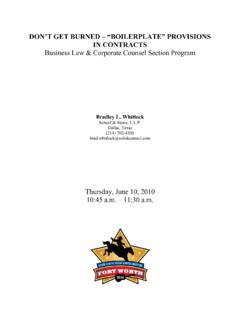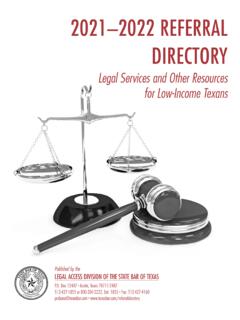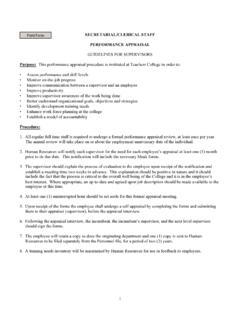Transcription of COMMITTEE ON DISCIPLINARY RULES AND REFERENDA …
1 COMMITTEE ON DISCIPLINARY RULES AND. REFERENDA PROPOSED RULE CHANGES. Texas DISCIPLINARY RULES of Professional Conduct Rule Terminology Rule Conflict of Interest: Former Client Rule Imputation of Conflicts of Interest: General Rule Rule Special Responsibilities of a Prosecutor The COMMITTEE on DISCIPLINARY RULES and REFERENDA , or CDRR, was created by Government Code section and is responsible for overseeing the initial process for proposing a DISCIPLINARY rule. Pursuant to Government Code section , the COMMITTEE publishes the following proposed RULES . The COMMITTEE will accept comments concerning the proposed RULES through April 5, 2022. Comments can be submitted at or by email to The COMMITTEE will hold a public hearing on the proposed RULES by teleconference at 10 CDT on April 6, 2022. For teleconference participation information, please go to This draft includes two proposed RULES , numbered to Together, those two proposed RULES would replace one rule, namely current Rule Current RULES would remain in effect and would be renumbered as RULES Cross-references contained in the Texas DISCIPLINARY RULES of Professional Conduct would be updated accordingly.
2 Proposed RULES (Redline Version) (h) Fitness denotes those qualities of physical, mental and psychological health that enable a person to discharge a lawyer's responsibilities Rule Terminology to clients in conformity with the Texas DISCIPLINARY RULES of Professional Conduct. Normally a lack of fitness is indicated most (a) Adjudicatory Official denotes a person who serves on a Tribunal. clearly by a persistent inability to discharge, or unreliability in carrying out, significant obligations. (b) Adjudicatory Proceeding denotes the consideration of a matter by a Tribunal. (i) Fraud or Fraudulent denotes conduct having a purpose to deceive and not merely negligent misrepresentation or negligent failure to (c) Belief or Believes denotes that the person involved actually apprise another of relevant information. supposed the fact in question to be true. A person's belief may be inferred from circumstances.
3 (j) Informed consent denotes the agreement by a person to a proposed course of conduct after the lawyer has communicated adequate (d) Competent or Competence denotes possession or the ability information and explanation about material risks of and reasonably to timely acquire the legal knowledge, skill, and training reasonably available alternatives to the proposed course of conduct. If a rule calling necessary for the representation of the client. for informed consent requires specific disclosures (see, , Rule (c)(2)), consent is not informed unless those disclosures have been made. (e) Consult or Consultation denotes communication of information and advice reasonably sufficient to permit the client to appreciate (k) Knowingly, Known, or Knows denotes actual knowledge of the the significance of the matter in question. fact in question. A person's knowledge may be inferred from circumstances. (f) Confirmed in writing, when used in reference to the informed (l) Law firm : see Firm.
4 Consent of a person, denotes informed consent that is given in writing by the person or a writing that a lawyer promptly transmits (m) Partner denotes an individual or corporate member of a partnership to the person confirming an oral informed consent. See paragraph or a shareholder in a law firm organized as a professional corporation. (j) for the definition of informed consent. If it is not feasible to obtain or transmit the writing at the time the person gives informed (n) Person includes a legal entity as well as an individual. consent, then the lawyer must obtain or transmit it within a reasonable time thereafter. (o) Reasonable or Reasonably when used in relation to conduct by a lawyer denotes the conduct of a reasonably prudent and competent lawyer. (g) Firm or Law firm denotes a lawyer or lawyers in a private firm; or a lawyer or lawyers employed in the legal department of a (p) Reasonable belief or Reasonably believes when used in reference corporation, legal services organization, or other organization, or in to a lawyer denotes that the lawyer believes the matter in question a unit of government.
5 And that the circumstances are such that the belief is reasonable. 196 Texas Bar Journal March 2022 (q) Represent, Represents, or Representation. A lawyer represents cases to consider the underlying purpose of the Rule that is involved. a person if the person is a client of the lawyer. If the relationship of A group of lawyers could be regarded as a firm for purposes of the client and lawyer terminates, the lawyer's representation of the Rule that the same lawyer should not represent opposing parties in client terminates. litigation, while it might not be so regarded for purposes of the Rule that information acquired by one lawyer is attributed to another. (r) Should know when used in reference to a lawyer denotes that a reasonable lawyer under the same or similar circumstances would 3. With respect to the law department of an organization, including know the matter in question. the government, there is ordinarily no question that the members of the department constitute a firm within the meaning of the RULES of (s) Screened denotes the isolation of a lawyer from any participation Professional Conduct.
6 There can be uncertainty, however, as to the in a matter through the timely imposition of procedures within a identity of the client. For example, it may not be clear whether the firm that are reasonably adequate under the circumstances to law department of a corporation represents a subsidiary or an protect information that the isolated lawyer is obligated to protect affiliated corporation, as well as the corporation by which the members under these RULES or other law. of the department are directly employed. A similar question can arise concerning an unincorporated association and its local affiliates. (t) Substantial when used in reference to degree or extent denotes a matter of meaningful significance or involvement. 4. Similar questions can also arise with respect to lawyers in legal aid and legal services organizations. Depending upon the structure (u) Tribunal denotes any governmental body or official or any other of the organization, the entire organization or different components person engaged in a process of resolving a particular dispute or of it may constitute a firm or firms for purposes of these RULES .
7 Controversy. Tribunal includes such institutions as courts and administrative agencies when engaging in adjudicatory or licensing Fraud activities as defined by applicable law or RULES of practice or procedure, 5. When used in these RULES , the terms fraud or fraudulent refer as well as judges, magistrates, special masters, referees, arbitrators, to conduct that is characterized as such under applicable substantive mediators, hearing officers and comparable persons empowered to or procedural law and has a purpose to deceive. This does not resolve or to recommend a resolution of a particular matter; but it include merely negligent misrepresentation or negligent failure to does not include jurors, prospective jurors, legislative bodies or their apprise another of relevant information. Silence may be fraudulent committees, members or staffs, nor does it include other governmental if there is a duty to speak and intent to deceive.
8 For purposes of bodies when acting in a legislative or rule-making capacity. these RULES , it is not necessary that anyone has suffered damages or relied on the misrepresentation or failure to inform. (v) Writing or written denotes a tangible or electronic record of a communication or representation, including handwriting, typewriting, Informed Consent printing, photostating, photography, audio or videorecording, and electronic 6. Many of the RULES of Professional Conduct require the lawyer to communications. A signed writing includes an electronic sound, obtain the informed consent of a client or other person. The communication symbol or process attached to or logically associated with a writing necessary to obtain such consent will vary according to the Rule and executed or adopted by a person with the intent to sign the writing. involved and the circumstances giving rise to the need to obtain informed consent.
9 The lawyer must make reasonable efforts to ensure Comment: that the client or other person possesses information reasonably Confirmed in Writing adequate to make an informed decision. Ordinarily, this will require 1. If it is not feasible to obtain or transmit a written confirmation at communication that includes a disclosure of the facts and circumstances the time the client gives informed consent, then the lawyer must giving rise to the situation, any explanation reasonably necessary to obtain or transmit it within a reasonable time thereafter. If a lawyer inform the client or other person of the material advantages and has obtained a client's informed consent, the lawyer may act in disadvantages of the proposed course of conduct and a discussion reliance on that consent so long as it is confirmed in writing within of the client's or other person's options and alternatives. In some a reasonable time thereafter.
10 Circumstances it may be appropriate for a lawyer to advise a client or other person to seek the advice of other counsel. A lawyer need 2. Whether two or more lawyers constitute a firm can depend on not inform a client or other person of facts or implications already the specific facts. For example, two practitioners who share office known to the client or other person; nevertheless, a lawyer who space and occasionally consult or assist each other ordinarily would does not personally inform the client or other person assumes the not be regarded as constituting a firm. However, if they present risk that the client or other person is inadequately informed and the themselves to the public in a way that suggests that they are a firm consent is invalid. In determining whether the information and or conduct themselves as a firm, they should be regarded as a firm explanation provided are reasonably adequate, relevant factors include for purposes of the RULES .







